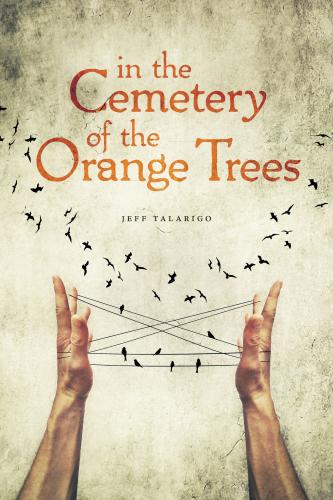ALSO BY JEFF TALARIGO
The Pearl Diver
The Ginseng Hunter
© 2016 by Jeff Talarigo
All rights reserved. Except for brief quotations in critical articles or reviews, no part of this book may be reproduced in any manner without prior written permission from the publisher:
Etruscan Press
Wilkes University
84 West South Street
Wilkes-Barre, PA 18766
(570) 408-4546
Published 2018 by Etruscan Press
Cover design by Carey Schwartzburt
Interior design and typesetting by Susan Leonard
The text of this book is set in Chapparal Pro.
First Edition
17 18 19 20 5 4 3 2 1
Library of Congress Cataloguing-in-Publication Data
Names: Talarigo, Jeff, author.
Title: In the cemetery of the orange trees / by Jeff Talarigo.
Description: First edition. | Wilkes-Barre, PA: Etruscan Press, [2018]
Identifiers: LCCN 2017014816 | ISBN 9780998750811 (eBook)
Subjects: LCSH: Palestinian Arabs--Fiction. | Culture conflict--Fiction. | BISAC: FICTION / Literary. | FICTION / Family Life. | FICTION / Political. | GSAFD: Allegories.
Classification: LCC PS3620.A525 I5 2018 | DDC 813/.6--dc23
LC record available at https://lccn.loc.gov/2017014816
Please turn to the back of this book for a list of the sustaining funders of Etruscan Press.
The characters and events in this book are fictitious. Any similarity to real persons, living or dead, is coincidental and not intended by the author.
This book is printed on recycled, acid-free paper.
For the people of Jabaliya, and
for my father.
Seal me with your eyes.
Take me wherever you are—
Mahmoud Darwish
Table of Contents
The Night Guardian of the Goat
Acknowledgments
So many have helped make this book possible.
From the Ohio years: Jack Hoover, Roger Gochneaur, Bill Currin and Barb McFarland—for being beams of light in those darkest of days.
To all the people in block number four in Jabaliya, especially the Elakra family and to Fayez, Bassam, Uncle Ali, Mustafa and Shafiq el Biss—for allowing me to see Gaza with my own eyes and for changing my life.
To the New York Public Library’s Cullman Center for Scholars and Writers class of 2006–2007, for giving me the greatest year a writer could hope for. Thanks in particular to the following fellows for their guidance and unwavering support: Jim Shapiro, Jim Miller, Maya Jasanoff and David Blight. Also, to Jean Strouse, the glue that keeps everything together, and Pamela Leo, Adriana Nova, Betsy Bradley, Sam Swope, Miriam Gloger and David Ferriero. And to my cousins, Bill Schierberl and Margaret Pomeroy—New York is a much emptier place without you.
All those in my Boston years: the wonderful people at Grub Street, Theresa Tobin at MIT Library, AGNI, for publishing a part of this book and for the careful eye of Jennifer Alise Drew, to a couple of early readers and listeners, Dana Sadji and Reema Tambosi, and to the greatest bookstore in the world—The Harvard Coop—a sanctuary where much of this was written.
All the students, past and present, and to the faculty at Wilkes University’s Low-Residency MA/MFA Program who have provided an enormous amount of feedback and encouragement. Mike Lennon for his suggestion to bring the American into the novel; Bonnie Culver for passing this manuscript along and to three late-stage readers, Kevin Oderman, Teresa Loeffert, and Bev Donofrio.
Everyone at Etruscan Press for their care, bravery and passion for this book: Phil Brady, Bob Mooney, Bill Schneider, Pamela Turchin, Danielle Watson, Bob Antinozzi, Susan Leonard and Carey Schwartzburt.
And finally, to my mother, my father-in-law, Tadashi Toshimitsu, my wife, Aya, and son, Sam, who have also carried this book along with them for so many years.
He has come here, to the land of the forgotten, in order that he may forget, that within their story he may perhaps find his.
His first hour there.
He appears in the city square on a February afternoon, unbeknownst to anyone, a backpack stooping his shoulders. Standing along Salah el Din Street, eating a falafel sandwich, eyes of curiosity are on the stranger, eyes of distrust, but they turn from him and down the street in an instant to where a convoy of soldiers approaches. Above him, unseen, a group of boys lurk on the rooftop, the stones in their hands itch their palms, and when the first jeep is within range they throw them. A loud bang and then another against the side of a jeep startle the stranger. Within seconds the soldiers are shooting at the boys and he, frozen, is caught in the crossfire. There is an alleyway behind him and he escapes into it. People are shouting, throwing anything they get their hands on: rocks, bottles, bananas, a water pipe. An old man yanks off his left shoe and fires it into the throng of soldiers. He watches the old man hobble away, leaving the shoe in the middle of the street. A soldier in the back of a jeep aims his Kalashnikov and shoots dead the shoe.
There is much the American does not know.
That one should never stand beneath the roof
